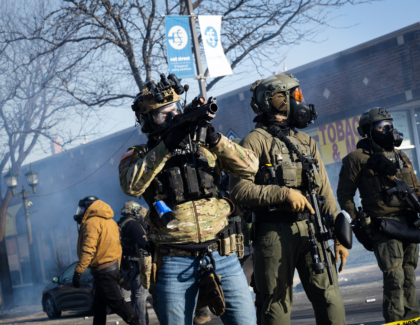Sign up for the daily CJR newsletter.
When we first saw the title “Justice Sunday” in our TV Guide, we were up for a little Charles Bronson/Clint Eastwood mayhem. Imagine our surprise when what we got instead was a congregation of evangelical Christians trying to garner public support for the “nuclear option” proposed by Senate Republicans to abolish the filibuster.
Senator Bill Frist weighed in via satellite. Frist, and other speakers at the event, demanded that Democrats stop filibustering a handful of the president’s most conservative judicial nominations, and called for “up or down” votes on the judges in question.
Today’s reporting about the event played it pretty straight — giving us the typical “he said/she said” version of events, with contrasting quotes from Frist, his Democratic counterpart Senate Minority Leader Harry Reid, Focus on the Family’s James Dobson, and a spate of “liberal” religious leaders speaking ill of other religious leaders taking part in the fight.
But in truth the filibuster fight is not quite as cut and dry as a Democrat/Republican split. As the Los Angeles Times pointed out yesterday, a group of the country’s leading business lobbying associations have let it be known that they won’t back the “nuclear option.” Doing so, they say, will cause the Democrats to suspend all action in the Senate, which would bottle up several initiatives the business community wants Congress to act on.
Despite this, the New York Times still clung to the line that “liberal groups” are the main opponents of the proposed rule change. Yet even one of the event’s organizers, James Dobson, said last night that the Senate has “six or eight very squishy Republicans” who haven’t publicly committed to helping change the filibuster rule. Seems the Times doesn’t have the same Congressional connections as Dobson, else surely they might have tried to get a quote from one of the “squishy” Republican Senators whose pictures, names, and office phone numbers were broadcast on giant video screens at the event.
Also of note is the fact that the Times and the Washington Post mentioned only in passing Frist’s explicit reference to Texas Supreme Court Judge Priscilla Owen as an example of one of the conservative judges blocked by the Democrats.
The Post writes that:
Frist singled out appellate court nominee Priscilla R. Owen of Texas for special praise, suggesting she may become the contested nominee at the focus of the looming showdown. Democratic opponents say Owen went beyond the law in her opinion dealing with abortions for minors.
Both papers ignore the fact that Attorney General Alberto Gonzales (a Republican last time we checked) once called Owen’s dissenting opinion in the same case “an unconscionable act of judicial activism.” Sounds familiar, doesn’t it? While Gonzales now calls Owen “superbly qualified” for her nomination to the Fifth Circuit Court of Appeals, the liberal People for the American Way pointed out in a July 2002 press release that, “Although they served together for a relatively short time in 1999-2000, Gonzales wrote or joined more than a dozen opinions sharply criticizing opinions written or joined by Owen on the court.”
Despite the ease with which information like this can be dug up by performing a simple Google search, reporters consistently rely on the tired construction of framing most political stories as simple partisan squabbles. It’s obvious that more than just “liberals” and “Democrats” oppose the nuclear option in general, and Owens’ nomination in particular. Including the messy bipartisan details might make writing the story a little trickier — but it would give the public a picture that comes a little closer to reality.
–Paul McLeary
Has America ever needed a media defender more than now? Help us by joining CJR today.






